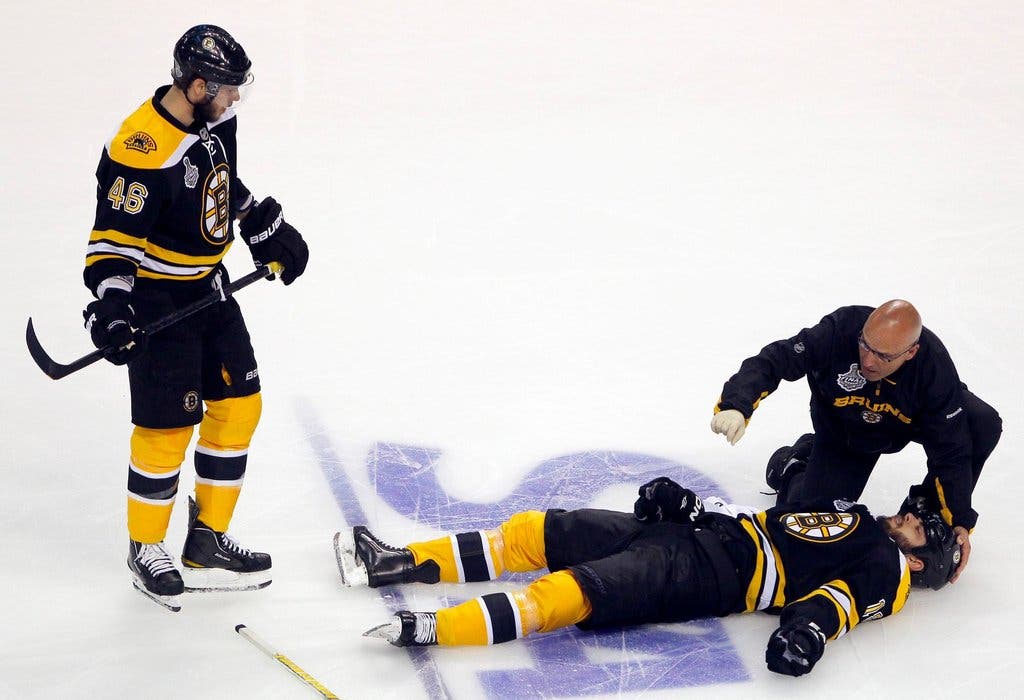
( Photo Credit: Brian Snyder/Reuters )
By: Max Mainville | Check me out on Twitter @tkdmaxbjj
June 1st, 2020 marked the ninth anniversary of Game One of the 2011 Stanley Cup Finals. The best-of-seven series put the Boston Bruins, a team looking to end a 39-year Stanley Cup drought, up against the Vancouver Canucks, the 2010-11 Presidents’ Trophy Champions looking for their first Cup win in franchise history. Before we dive into the Finals itself, we have to look at how both of the teams earned their spot to compete for Lord Stanley’s Cup.
As previously mentioned, the Canucks entered the Finals as the best regular-season team, finishing the 2010-11 campaign with a 54-19-9 record. Vancouver scored the most goals (262), allowed the least amount of goals (185), and was arguably one of the favorites to go deep in the playoffs.
In the opening round, the Canucks were positioned to play the defending Stanley Cup Champion Chicago Blackhawks. Vancouver exploded to a commanding 3-0 series lead only for the Hawks to storm back and force a Game 7. Even with that, a game-winning goal by Alex Burrows won the series for the Canucks and led them to the second round to play the Nashville Predators who were coming off of a six-game series victory over the Anaheim Ducks.
Vancouver won games one, three, and four to take a 3-1 series lead and while the Predators won Game Five, the Canucks closed the show in a 2-1 win in Game Six to move onto the Conference Finals against the San Jose Sharks, the first-place team in the Pacific Division. This would be the easiest series yet for the Blue and White as they’d cruise to a 4-to-1 series victory, advancing to the Stanley Cup Finals for the first time since 1993-94.
Meanwhile, in the Eastern Conference, the Boston Bruins were on their road to the Finals as well. Following a 46-25-11 record that won them the Northeast Division, the Bruins entered the 2011 postseason with a chance to go far, but many felt other teams would make it further. To add to the drama, the Bruins had to play their long-time rivals, the Montreal Canadiens in Round One.
This opening round was the definition of a back-and-forth playoff series. Montreal won the first two meetings on the road, followed by two wins by Boston in Montreal. In a pivotal Game Five, Bruins forward Nathan Horton scored the game-winning goal in double-overtime to give Boston their first lead in the series. The Canadiens took the sixth game, only for Boston to eliminate them on home ice off of Horton’s OT winner in Game Seven.
Now, for a second-consecutive season, the Boston Bruins would face off against the Philadephia Flyers in the Eastern Conference Semi-Finals. The year prior, the Bruins held a 3-0 series lead, only for the Flyers to storm back and win the series in a dramatic Game 7, stunning Boston. With a chance at redemption, the Black and Gold took a 3-0 series once again, but this time, ending things in Game Four, advancing to the Eastern Conference Finals.
In one of the closest, most nail-biting series I can remember, the Bruins battled the Tampa Bay Lightning in the Conference Finals. Just like the Bruins, the Bolts swept their previous round (Washington Capitals) and were riding on a ton of momentum. The series was intense all the way to Game Seven, where once again, Nathan Horton scored the eventual game-winner in the third period. Horton’s 8th of the postseason secured a berth in the 2011 Stanley Cup Finals.
Finally, the 2011 Stanley Cup Finals. The Boston Bruins versus the Vancouver Canucks in a best-of-seven series that will break the hearts of one fanbase and cause a mass celebration for the other. As they had in every other series, the Canucks earned home-ice advantage and in the Finals, they took that advantage and ran with it, winning the first two games of the series by scores of 1-0 in Game One and a 3-2 overtime win in Game Two.
Now, the series shifts to Boston with the Bruins facing a tough task, having to bounce back from a 2-0 deficit to have a shot at winning the Cup. Five minutes into the opening frame of Game Three, the Bruins are executing a breakout play out of the defensive zone. Captain Zdeno Chara sends a pass up the ice to Nathan Horton who skates through the neutral zone, before handing it off to Milan Lucic just before entering the Vancouver zone. Over a second after releasing the puck, Aaron Rome, a 6-foot-1, 218-pound defenceman hits Horton, knocking him out cold.
Horton laid on the ice for several minutes after the hit before being stretchered out of TD Garden. He was hospitalized overnight and was diagnosed with a severe concussion and was forced to miss the remainder of the Stanley Cup Finals. At this time, Horton had scored eight goals in the 2011 postseason included three game-winning goals and the two series-clinching goals showcased above. This put the Bruins without arguably their most clutch player for the rest of the series.
Vancouver’s Aaron Rome did not get away without dealing with consequences, though. Rome was handed a five-minute game misconduct for interference and the NHL later announced that Rome would be suspended for the remainder of the Finals, making it the longest suspension in Stanley Cup Finals history at the time.
The first period of Game Three ended with a 0-0 tie, but the Bruins exploded, scoring four goals in the middle frame and then another four in the final period to take a dominate 8-1 victory. In Game Four, Tim Thomas stopped all 38 shots and Rich Peverley scored twice to help Boston win 4-0 and tie the series heading back to Vancouver.
In Game Five, the Canucks blanked the Bruins 1-0 courtesy of Roberto Luongo’s 31-save performance, putting the Canucks only one win away from winning the series. Although, facing elimination was not new for these Boston Bruins having two Game Seven victories under their belt, but now, they were playing for their teammate Nathan Horton. A four-goal first-period in Boston forced a Game Seven on the road in Vancouver.
Throughout the series so far, the only wins by the Bruins – were at home. Every game in Vancouver found the Bruins not only losing, but getting shutout twice as well. For this reason, Horton filled a water bottle of melted TD Garden ice, and before puck drop in the do-or-die Game Seven, poured the water onto the ice at Rogers Arena in Vancouver. It may just be superstition, but it was Horton’s way of continuously helping the Boston Bruins even without actually playing for them.
https://www.youtube.com/watch?v=Y1Bz2EtxfME
Hockey fans all know how this story ends. Brad Marchand and Patrice Bergeron each scored a pair of goals and the Boston Bruins hoisted the Stanley Cup for the first time since Bobby Orr’s team did the same in the 1971-72 Finals. The 2010-11 Boston Bruins were not just a “team”, they were family and that was put on full display for them to come back from being down 2-0 in the series and win the Stanley Cup. They played for Nathan Horton and came through on it.

( Photo Credit: thespec.com )
It is impossible to know the results of the 2011 Stanley Cup Finals if Aaron Rome never landed that hit on Nathan Horton but what we do know, is that the tides changed the moment that injury happened. To this day, it is one of the greatest stories in the history of the Boston Bruins franchise.
Note: Statistics and information used in this article are courtesy of hockeyreference.com, cbc.ca, and nhl.com.


Leave a Reply